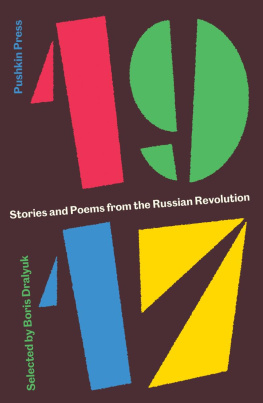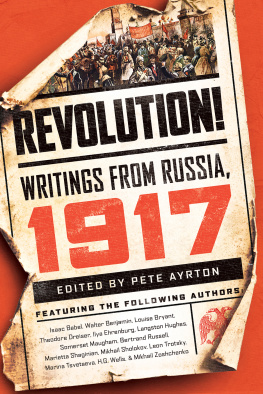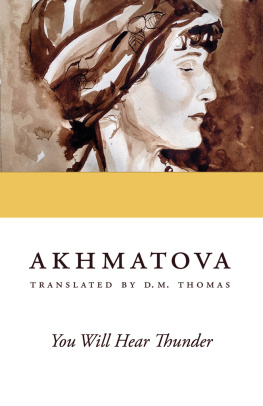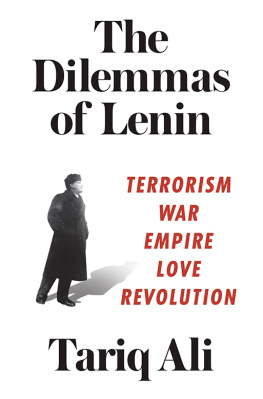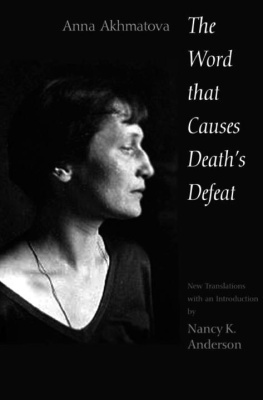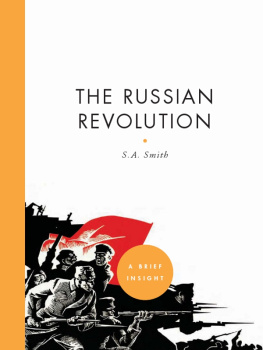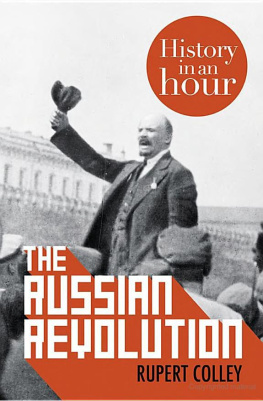T he pieces Ive chosen for this collection were written between February 1917, when the revolutionary forces in Petrograd and Moscow toppled the Romanov dynasty, and late 1919, when the Bolsheviks, who had seized power on 25 October (7 November, NS) 1917, finally turned the tide against the White Army in the Russian Civil War of 191721. The rationale for limiting the anthologys scope to these two and a half years was simple: My aim was not so much to tell the story of the revolutionary period as to steep the reader in its tumultto recreate the heady brew of enthusiasm and disgust, passion and trepidation that intoxicated Russia and the world as the events unfolded. Consequently, I wanted to avoid memoirs and retrospective works of fiction, as well as commemorative poems, of which there is no dearth. These backward-looking works, be they written from a Soviet or anti-Soviet perspective, treat the revolutions and the Civil War as a single fait accompli, a decisive but entirely decided matter. Many important longer works are also readily available in stand-alone translations; I draw on and point to these works in the introductory notes to the anthologys subsections.
As for the story of the Russian Revolution, it has been told many times. In English, it has been covered especially well by Orlando Figes, Sheila Fitzpatrick and Robert Service, and this anthology may be read alongside their volumes. Since my target audience is English-speaking, I have tried to use English-language sources in my notes whenever possible.
The first part of the collection, The Revolution: A Poem-Chronicle, takes its title from a long poem by Vladimir Mayakovsky (see pp. 6870), written in the month or so following the February Revolution, in which the poet declares:
The courses of planets,
the existence of states:
all are subordinate to our wills.
The earth is ours.
The air is ours.
Ours is the diamond mine of the stars.
And we will never
no, we will never!
permit a soul
no, not a soul!
to tear at our earth with cannon balls,
to pierce our air with the points of spears.
(Translated by James Womack)
Mayakovskys radical prediction that the events of February would bring about lasting peace was, of course, proved tragically wrong. The Provisional Government refused to withdraw Russian troops from the First World War, a fact the Bolsheviks used to justify their takeover in October. And though the Bolsheviks did secure a peace with the Central Powers at Brest-Litovsk on 3 March 1918, their coup plunged Russia into a protracted civil war, with Russias former alliesincluding the French, the British and the Americansintervening on behalf of the White opposition. The combination of passionate idealism and tragic misapprehension in Mayakovskys poem lends it great poignancy. His poem-chronicle could not have been written in the 1920s, after the dust of 1917 had settled. I feel the same can be said of most of the poems I have selected for my poem-chronicle. They are grouped in six sections, each linked by a common theme, attitude or striking image. The introductions are brief, and anyone wishing to learn about the lives of most of these poets and to read more of their work may consult The Penguin Book of Russian Poetry (2015), edited by Robert Chandler, Irina Mashinski and myself.
The second part of the collection is devoted to prose, and it too is separated into sections linked by theme or some other unexpected commonality. The introductions to these sections are more substantial, providing fuller biographical sketches of the authors, many of whom are little known in the English-speaking world, and some of whom are almost forgotten even in Russia. I have also included one story translated from the Yiddish of Dovid Bergelson, as well as a poem translated from the Georgian of Titsian Tabidze; the events of 1917 affected all the peoples of the Russian Empire, and had I the space, I would have included pieces translated from Estonian, Latvian, Lithuanian, Polish, Ukrainian and the languages of Central Asia. Had I more space yet, I would have included works by authors from around the globe, since the days of 1917 did indeed, to paraphrase John Reed, shake the world.
Much of my work on this anthology was done in Scotland, and I would like to illustrate the riches I have had to exclude for reasons of language, geography and chronology by quoting Hugh MacDiarmids (18921978) electrifying quatrain The Skeleton of the Future (At Lenins Tomb), written in the early 1930s:
Red granite and black diorite, with the blue
Of the labradorite crystals gleaming like precious stones
In the light reflected from the snow; and behind them
The eternal lightning of Lenins bones.
I must thank Adam Freudenheim, Gesche Ipsen and Julia Nicholson at Pushkin Press, for commissioning me to work on this dream of a project and for all the support and encouragement they have given me along the way. I owe a great debt to the brilliant translators who have contributed their talents to this anthology: Josh Billings, Maria Bloshteyn, Michael Casper, Robert Chandler, Peter France, Rose France, Lisa Hayden, Bryan Karetnyk, Martha Kelly, Donald Rayfield, Margo Shohl Rosen and James Womack. It is my honour to foreground their work, and I am just as honoured to reintroduce the work of translators who are no longer with us: Mirra Ginsburg, Jack Lindsay, Alex Miller, Gerard Shelley and Jon Stallworthy. I am deeply grateful for the help and advice of my colleagues Emily Finer, Victoria Donovan, Katharine Holt, Olga Voronina and Claire Whitehead of the University of St Andrews, and Yelena Furman, Georgiana Galateanu, Olga Kagan, Susan Kresin, Gail Lenhoff, Lada Panova and Ronald Vroon of UCLA. I am especially grateful to Sean Griffin, Roman Koropeckyj and Michael Lavery of UCLA, whoquite characteristicallywent above and beyond the call of collegial duty. An event dedicated to this anthology at Pushkin House in London in October 2015, organized by Ursula Woolley, brought together an extraordinarily informed audience, including the poets D.M. Black, Stephan Capus, Peter Daniels and Stephen Watts, who made invaluable comments on the works I presented. Edythe Haber, an expert on Teffi, helped me sort out some mysteries regarding that authors work. I have saved my final tip of the hat for the remarkably knowledgeable and perceptive Stephen Dodson, whose sharp eyes have rescued me from myriad blunders. Needless to say, the blame for all remaining blunders lies with me.
I would like to dedicate this anthology to the memory of my grandmother, Yekaterina Pavlovskaya, who was a two-year-old girl in Odessa when the Bolsheviks seized power in Petrograd in 1917, and who outlived the Soviet Union by twenty-one years.
I n 1917 Maxim Gorky (18681936), a friend of Vladimir Lenins since 1907, began to publish a series of articles in the Petrograd daily Novaya Zhizn (New Life), raising serious questions about the behaviour of the Russian masses during that revolutionary year and, most daringly, about Bolshevik policy after the seizure of power in October. These untimely thoughts established Gorky, a committed Marxist, as the conscience of the revolution. On 7 December 1917, Gorky complained:
Every night for almost two weeks crowds of people have been robbing wine cellars, getting drunk, banging each other over the head with bottles, cutting their hands with fragments of glass, and wallowing like pigs in filth and blood. Over this period, wine worth several tens of millions of rubles has been destroyed, and, of course, hundreds of millions of rubles worth will continue to be destroyed.

